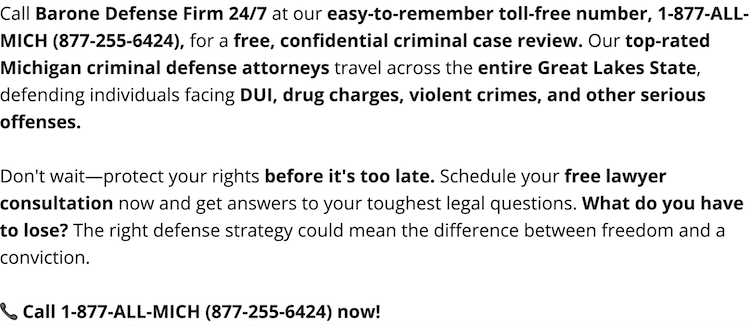Gun Charge Defense Strategies
The consequences of a gun charge can be severe in almost every instance. There are collateral consequences in addition to immediate consequences to every conviction that can cause problems well into the future after the case is settled. There are many defense strategies in Michigan gun cases that can apply to reduce, or in some instances, dismiss the charge. A skillful, knowledgeable, and well-prepared gun lawyer must raise the right Michigan gun defense strategies in court so that an individual can be in an excellent position to get the best possible result.
Second Amendment DefenseThe Second Amendment is both never a defense and always a defense. It is only because of the Second Amendment that we have the right to own and possess weapons of any kind. On the other hand, the Second Amendment in and of itself is never enough to defend against the gun charge.
For someone to be in lawful possession of a weapon, they must follow the state law, not the federal Second Amendment which is viewed very broadly as the right to keep and bear arms. The states have the ability to pass reasonable regulations to ensure that the Second Amendment right is effectively and safely discharged by anyone involved.
Defense Attorney's InvestigationAs with any other type of crime, an attorney's investigation usually begins with a combination of an interview with the client and any other witnesses the client is aware of. Most importantly, the attorney reviews the evidence the prosecutor obtained from the police to determine the strengths and the weaknesses of that evidence. The attorney can seize on those weaknesses to build a gun charge defense that demonstrates that the evidence does not show what the prosecutor is trying to prove or the evidence is inadmissible in some way.
EvidenceWhen there is any type of scientific evidence, the strategy is to have that evidence examined by another expert the defense retains, to determine whether the police expert did their job properly and whether they came to the right conclusion.
On the other hand, with evidence subject to a police officer's observations, the collection of evidence, or fingerprint evidence, the attorney may file motions and ask for evidentiary hearings where those witnesses must testify and be cross-examined. The goal is to keep something from being admitted into evidence and cripple the prosecutor's case in that way. This defense strategy for Michigan gun charges can also be used to encourage the prosecutor to offer a plea bargain or a reduction in the crime that might not otherwise be offered.
Diversion AgreementsIn general, there are different types of diversion agreements depending on someone's age and criminal record and whether the statute applies. Some types of diversion allow the case to be taken under advisement and dismissed after the advisement period. However, the charge itself never appears on the defendant's record.
Other types of diversion are such that the same result occurs. The matter is taken under advisement and then dismissed after a period of time. However, during the advisement period, the gun charge remains on an individual's record and can be found by employers and by law enforcement. It depends on the diversion agreement available at the time an individual is thinking about pleading guilty.
Taken under advisement means that the judge accepts the individual's plea and then sentences the individual as with any other crime. If the individual is able to successfully complete that sentence, the charge is dismissed. The judge reviews an individual's case before the conclusion of their probation to determine whether they were successful in following all of the orders set forth at the time of sentencing. A successful diversion agreement and completion can be a useful Michigan gun charge defense strategy.
 Barone Defense Firm Home
Barone Defense Firm Home




















